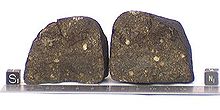- Cosmochemistry
-
Cosmochemistry or chemical cosmology is the study of the chemical composition of matter in the universe and the processes that led to those compositions. [1] This is done primarily through the study of the chemical composition of meteorites and other physical samples. Given that the asteroid parent bodies of meteorites were some of the first solid material to condense from the early solar nebula, cosmochemists are generally, but not exclusively, concerned with the objects contained within the solar system.
Contents
History
In 1938, Swiss mineralogist Victor Goldschmidt and his colleagues compiled a list of what they called "cosmic abundances" based on their analysis of several terrestrial and meteorite samples.[2] Goldschmidt justified the inclusion of meteorite composition data into his table by claiming that terrestrial rocks were subjected to a significant amount of chemical change due to the inherent processes of the Earth and the atmosphere. This meant that studying terrestrial rocks exclusively would not yield an accurate overall picture of the chemical composition of the cosmos. Therefore, Goldschmidt concluded that extraterrestrial material must also be included to produce more accurate and robust data. This research is considered to be the foundation of modern cosmochemistry.[1]
During the 1950's and 1960's, cosmochemistry became more accepted as a science. Harold Urey, widely considered to be one of the fathers of cosmochemistry,[1] engaged in research that eventually led to an understanding of the origin of the elements and the chemical abundance of stars. In 1956, Urey and his colleague, German scientist Hans Suess, published the first table of cosmic abundances to include isotopes based on meteorite analysis.[3]
The continued refinement of analytical instrumentation throughout the 1960's, especially that of mass spectrometry, allowed cosmochemists to perform detailed analyses of the isotopic abundances of elements within meteorites. in 1960, John Reynolds determined, through the analysis of short-lived nuclides within meteorites, that the elements of the solar system were formed before the solar system itself [4] which began to establish a timeline of the processes of the early solar system.
In October 2011, scientists reported that cosmic dust contains complex organic matter ("amorphous organic solids with a mixed aromatic-aliphatic structure") that could be created naturally, and rapidly, by stars.[5][6][7]
Meteorites
Meteorites are one of the most important tools that cosmochemists have for studying the chemical nature of the solar system. Many meteorites come from material that is as old as the solar system itself, and thus provides scientists with a record from the early solar nebula.[1] Carbonaceous chondrites are especially primitive; that is they have retained many of their chemical properties since their formation 4.56 billion years ago[8], and are therefore a major focus of cosmochemical investigations.
Recent findings by NASA, based on studies of meteorites found on Earth, suggests DNA and RNA components (adenine, guanine and related organic molecules), building blocks for life as we know it, may be formed extraterrestrially in outer space.[9][10][11]
References
- ^ a b c d McSween, Harry (2010). Cosmochemistry (1 ed.). Cambridge University Press. ISBN 0521878624.
- ^ Goldschmidt, Victor (1938). Geochemische Verteilungsgestze der Elemente IX. Oslo: Skrifter Utgitt av Det Norske Vidensk. Akad..
- ^ Suess, Hans; Urey, Harold (1956). "Abundances of the Elements". Reviews of Modern Physics 28 (1): 53–74. Bibcode 1956RvMP...28...53S. doi:10.1103/RevModPhys.28.53.
- ^ Reynolds, John (April 1960). "Isotopic Composition of Primordial Xenon". Physical Review Letters 4 (7): 351–354. Bibcode 1960PhRvL...4..351R. doi:10.1103/PhysRevLett.4.351. http://link.aps.org/doi/10.1103/PhysRevLett.4.351.
- ^ Chow, Denise (26 October 2011). "Discovery: Cosmic Dust Contains Organic Matter from Stars". Space.com. http://www.space.com/13401-cosmic-star-dust-complex-organic-compounds.html. Retrieved 2011-10-26.
- ^ ScienceDaily Staff (26 October 2011). "Astronomers Discover Complex Organic Matter Exists Throughout the Universe". ScienceDaily. http://www.sciencedaily.com/releases/2011/10/111026143721.htm. Retrieved 2011-10-27.
- ^ Kwok, Sun; Zhang, Yong (26 October 2011). "Mixed aromatic–aliphatic organic nanoparticles as carriers of unidentified infrared emission features". Nature. doi:10.1038/nature10542.
- ^ McSween, Harry (August 1979). "Are Carbonaceous Chondrites Primitive or Processed? A Review". Reviews of Geophysics and Space Physics 17 (5): 1059–1078. Bibcode 1979RvGSP..17.1059M. doi:10.1029/RG017i005p01059.
- ^ Callahan; Smith, K.E.; Cleaves, H.J.; Ruzica, J.; Stern, J.C.; Glavin, D.P.; House, C.H.; Dworkin, J.P. (11 August 2011). "Carbonaceous meteorites contain a wide range of extraterrestrial nucleobases". PNAS. doi:10.1073/pnas.1106493108. http://www.pnas.org/content/early/2011/08/10/1106493108. Retrieved 2011-08-15.
- ^ Steigerwald, John (8 August 2011). "NASA Researchers: DNA Building Blocks Can Be Made in Space". NASA. http://www.nasa.gov/topics/solarsystem/features/dna-meteorites.html. Retrieved 2011-08-10.
- ^ ScienceDaily Staff (9 August 2011). "DNA Building Blocks Can Be Made in Space, NASA Evidence Suggests". ScienceDaily. http://www.sciencedaily.com/releases/2011/08/110808220659.htm. Retrieved 2011-08-09.
See also
External links
Planetary Science Research Discoveries Educational journal with articles about cosmochemistry, meteorites, and planetary science
Categories:- Astrophysics
- Planetary science
- Astrochemistry
- Chemistry stubs
- Space stubs
Wikimedia Foundation. 2010.

